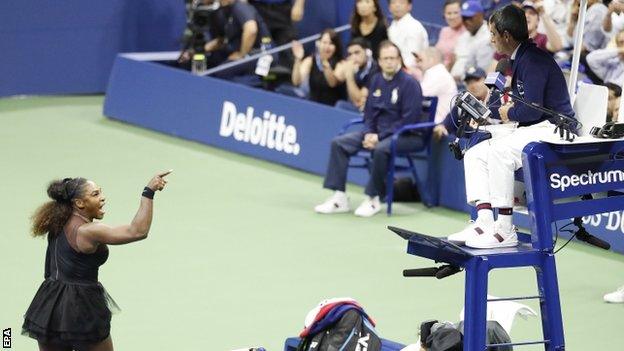US Open 2018: Serena Williams accuses umpire of sexism after outbursts in final
- Published

Serena Williams argued with umpire Carlos Ramos throughout the second set
Serena Williams accused the umpire of sexism in docking her a game in the US Open final and said she had not been cheating.
Naomi Osaka's 6-2 6-4 victory was overshadowed by Williams' extraordinary outbursts in the second set.
She received a code violation for coaching, a penalty point for racquet abuse and a game penalty for calling the umpire a "liar" and a "thief".
Afterwards the American said it was "sexist" to have been penalised a game.
"He's never taken a game from a man because they said 'thief'," the 36-year-old former world number one added.
"But I've seen other men call other umpires several things.
"I'm here fighting for women's rights and for women's equality and for all kinds of stuff."
Listen to Serena Williams' on-court outburst
American 12-time Grand Slam singles champion Bille Jean King, one of the founders of the Women's Tennis Association (WTA) backed Williams, saying: "When a woman is emotional, she's 'hysterical' and she's penalised for it. When a man does the same, he's 'outspoken' and there are no repercussions.
"Thank you, Serena Williams, for calling out this double standard. More voices are needed to do the same."
The issues began when Williams' coach Patrick Mouratoglou made a hand gesture towards her early in the second set at New York's Flushing Meadows - the rules say "communication of any kind" between player and coach is banned in Grand Slams.
Williams denied she received coaching, saying she would "never cheat to win and would rather lose", and demanded an apology from the umpire Carlos Ramos.
Mouratoglou, however, later admitted coaching.
Three games later Osaka was awarded a point when Williams was given another code violation for smashing her racquet.
Williams was furious, walking up to Ramos, shouting and pointing at him as the crowd started booing in support of the American in a toxic atmosphere.
At the next change of ends, Williams continued to rant, calling Ramos a "liar", telling him to "say you are sorry" and describing him as a "thief" for awarding a point to Osaka.
"For me, it blows my mind," the 23-time Grand Slam champion said. "But I'm going to continue to fight for women and to fight for us to have equality.
"This is just an example for the next person that has emotions, that wants to express themselves and wants to be a strong woman.
"They're going to be allowed to do that because of today. Maybe it didn't work out for me, but it's going to work out for the next person."
'I was not being coached'

Mouratoglou started coaching Williams in 2012
After the match Mouratoglou admitted he was coaching but added: "I don't think she looked at me."
He also said Osaka's coach was doing the same and that "everyone does it".
In her post-match news conference Williams said she was she "was not being coached" and that she "did not understand" why Mouratoglou would say he was doing so.
"I just texted Patrick, like, 'what is he talking about?' Because we don't have signals," she said.
"We have never discussed signals. I don't even call for on-court coaching [which is allowed on certain occasions in WTA events].
"I'm trying to figure out why he would say that. I don't understand. I want to clarify myself what he's talking about."
'I didn't know what was going on'

Naomi Osaka was in tears at the situation during the post-match ceremony
Before Williams' outbursts Osaka had dominated the first set in her first Grand Slam final, against a player she describes as her idol.
Throughout the second set she stayed composed in a difficult atmosphere to become Japan's first Grand Slam winner.
Afterwards, the 20-year-old said she "didn't know what was going on" between Williams and the umpire.
"I was just trying to focus," said Osaka, who was seeded 20th.
"Since it was my first Grand Slam final, I did not want to get overwhelmed.
"Serena came to the bench and told me she had a point penalty and when she got the game penalty I didn't know that either.
"I was just trying to focus on myself at that time."